The COVID-19 pandemic has had a significant impact on every single industry around the world. As countries shut down and businesses close their doors, people around the world are self-isolating and working from home. This has created a “quarantine economy” which is both a boon and a challenge to big and small companies. While people working from home have to adjust to a new way of life, businesses have to make big changes to continue making sales and survive the year.
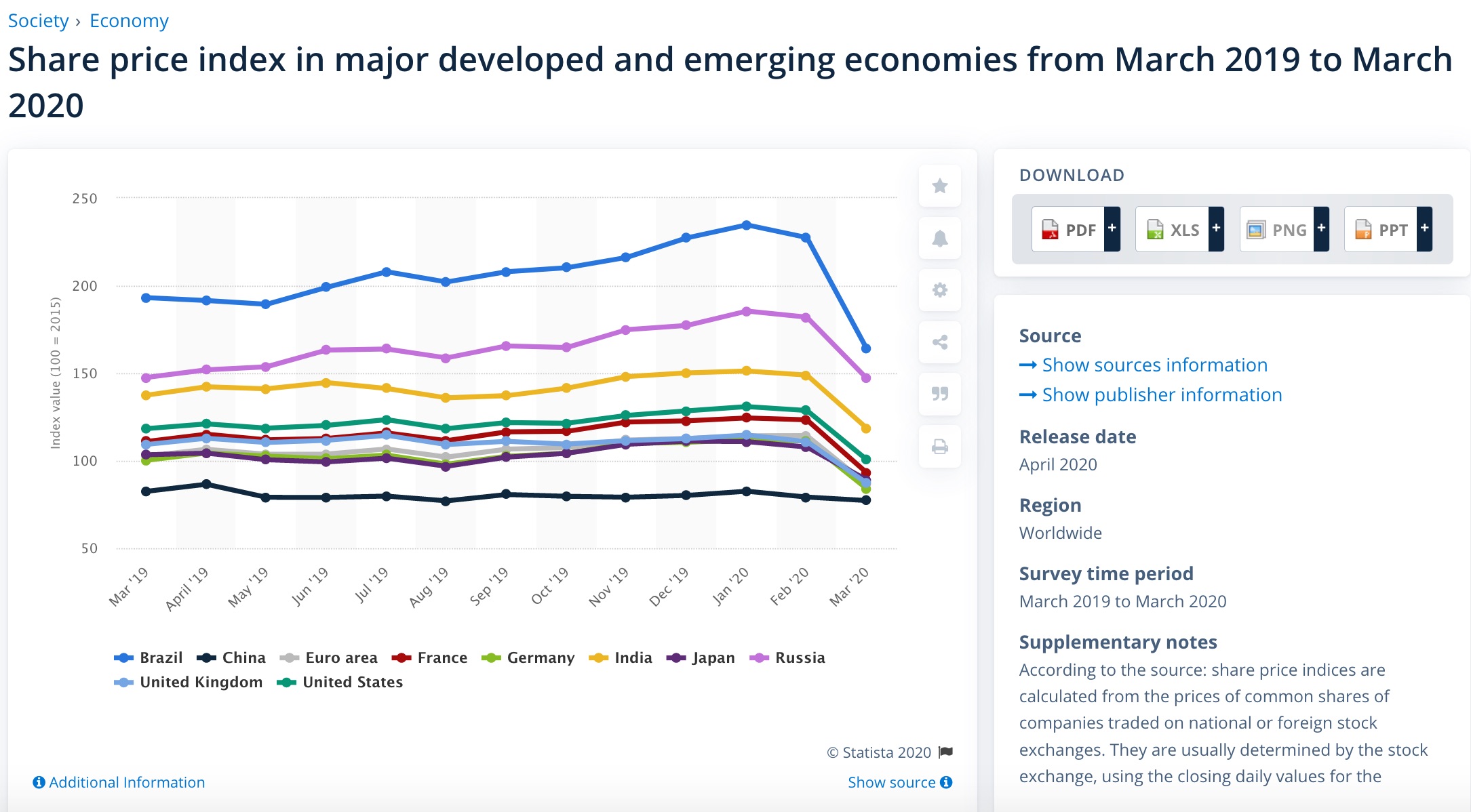
Despite the devastating global trend, the novel corona virus has created a huge opportunity for Amazon sellers. People staying at home and working on their computers mean people who still want and need to shop online even more than before. So much more than before, that now Amazon is even trying to get their shoppers to buy less. Even Shopify traffic is now at levels of Black Friday / Cyber Monday, every day.
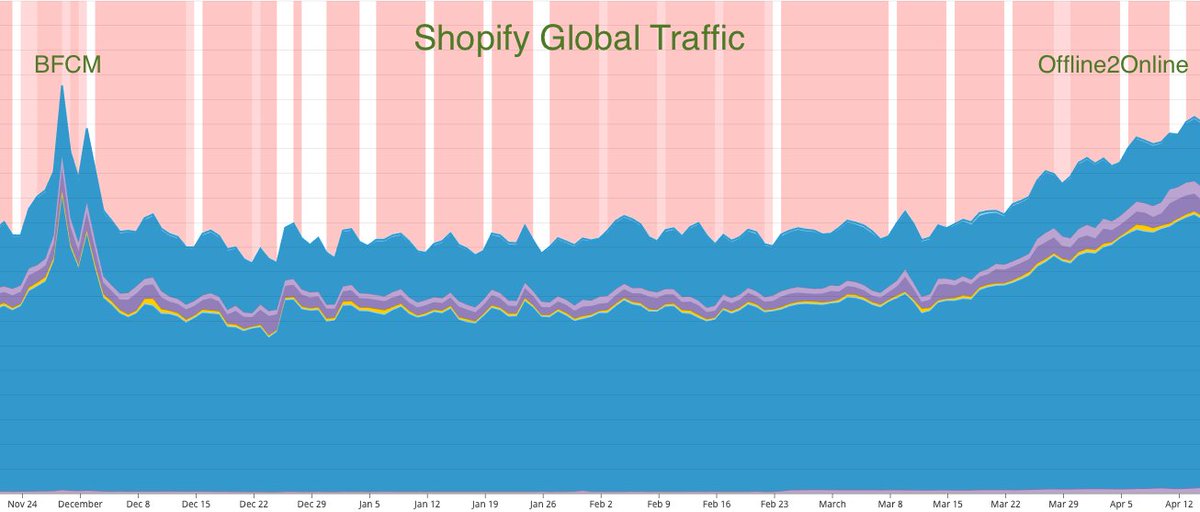
How can Amazon third-party sellers take on this challenge and survive? What are some of the challenges sellers have to face in 2020? What opportunities will come in 2020? In this article we will cover everything you need to know as an Amazon seller to keep your Amazon selling business going during the COVID-19 global pandemic.
Amazon Prioritizes “Essential Goods” for Delivery
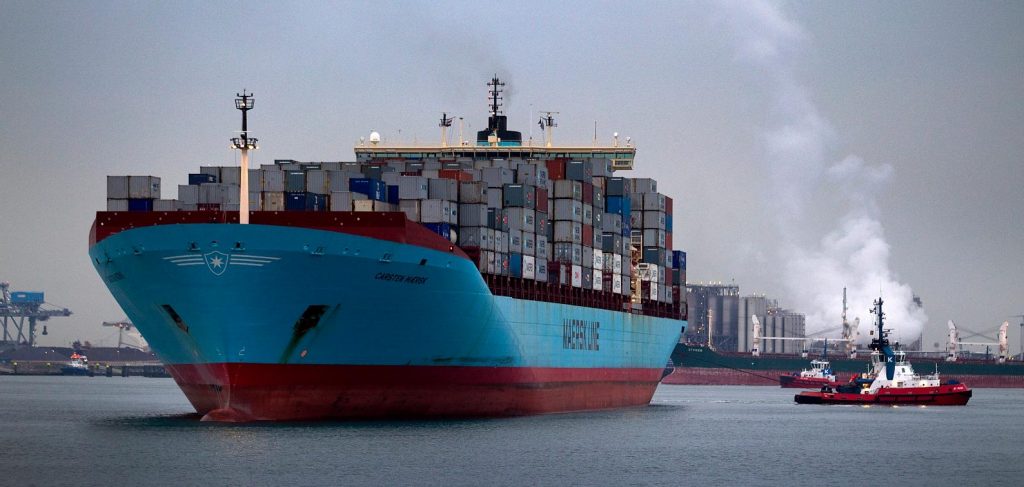
Amazon’s biggest change has been their attitude regarding what ships and what does not. Amazon is deliberately shipping essential goods first. This includes:food, medical supplies, household goods such as toiletries, baby items, beauty and personal care, and pet supplies. Essentially, things people would need to stay safe and healthy at home. Anything that doesn’t fall into the “essential goods” category is experiencing shipping delays of anywhere from a week to a month.
As a seller, your products are not being sent to Amazon’s fulfillment centers and your supply is not getting replenished. This freeze on non-essential items is meant to be only temporary. But the situation with COVID-19 quickly changes. Products that are in Amazon’s fulfillment centers or that are on their might not entering the supply chain.
What does that mean for you? It means that if you have stock to move — and to ensure that you continue selling products — you should switch gears by pausing FBA and fulfilling your sales through Fulfillment by Merchant (FBM). There are no restrictions on sellers to use FBM.
And just because Amazon is prioritizing the delivery of essential goods first, this is not time to cancel your Prime listings. People are spending more time at home. They are signing up for Amazon Prime to get entertainment options like Prime Video, Music and Audible. New Prime users will no doubt search for Prime listings for free and quick delivery.
Can Your Amazon Sales still Grow during these times?!
The answer is: YES, of course your sales can grow. As we saw in the previous paragraph sales are generally increasing because shoppers spend more time at home and have more time to buy things they need and can’t go get outside. Depending on which categories your products are, you might be able to see a more or less aggressive increment on your sales. This is definitely not the time to stop your advertising (unless you are completely running out of stock). See more on the paragraph below about advertising.
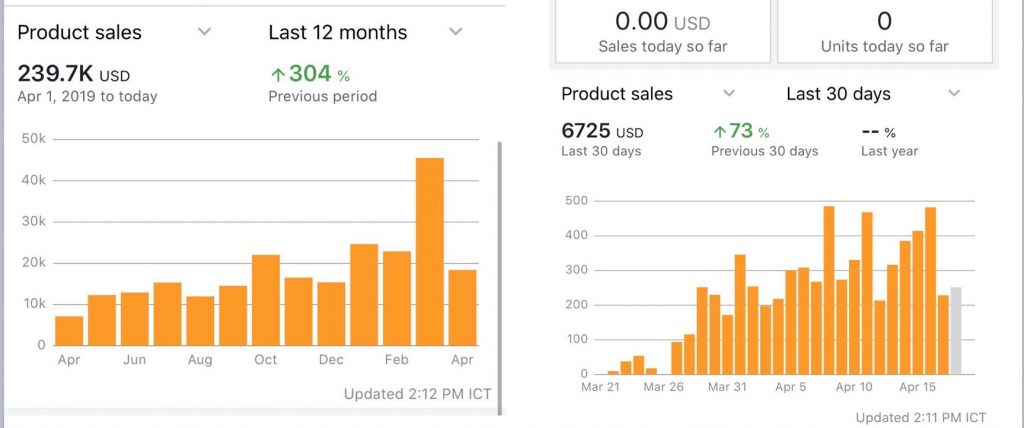
What is Amazon doing to help Sellers
At the end of March, Amazon announced that it was waiving two weeks of inventory storage fees for products stored in the United States, Canada, the United Kingdom, Italy, France, Spain, Poland and the Czech Republic. This is in addition to previous updates:
- “Waiving the April 15 long-term storage fees for inventory stored in the US and Europe.”
- “Pausing repayments and interest until April 30 for sellers with direct loans from Amazon Lending.”
- “Waiting April fees for those using Seller Account Management or the Launchpad Program.”
Amazon is taking measures to reduce the impact of the crisis on sellers’ accounts and allowing them to use the Restock Inventory Page and Restock Report to “check which products are eligible for shipment creation.”
Business as usual for Amazon
Amazon’s entire business is built on the backbone of the Internet and believing that traditional retail is coming to an end and online shopping is the future. Jeff Bezos bet on this gamble and made Amazon the most valuable company in the world. To meet this demand in online shopping, Jeff Bezos’ recent letter to shareholders shows that Amazon is:
- Hiring thousands of new warehouse workers
- Raising the wages of workers and paying double overtime
- Taking critical steps for the safety of staff and customers
- Funding independent delivery services and drivers
- Suspending seller accounts who practice price-gouging
- Spending hundreds of millions of dollars to help people and communities
Not only is this move the right thing to do, it is a huge public relations move. This helps build deep trust in the company and ensure that come 2021, more and more people will become Amazon shoppers, which means more target customers for Amazon sellers.
More people at home = More online buyers

When the corona virus first hit major western countries, it had a major impact on people’s lives. Many people lost their jobs and those who didn’t quickly had to adjust to working from home. This first shock wave of Covid-19 has passed and with many governments stepping in with employment insurance, stimulus checks and deferral of mortgage and bill payments, reality has set in.
Buyers still want to and need to shop online a lot. People locked in their homes are bored and retail therapy is as important as ever. But with malls, stores and borders closed — compounded with the fear people have of going outside — buyers are turning to online shopping. With online shopping, everything arrives at their door and they don’t have to step outside. Amazon’s biggest problem right now is meeting soaring demand.
Instead of shopping for things like clothing and travel necessities, customers are buying groceries, office supplies, fitness equipment, home entertainment, children’s books and education materials. This presents a key opportunity for Amazon sellers in the right niches. Keep an eye on these items because as demand soars, shipping delays may be removed. If you’re a seller with multiple brands in the right niches, you will see success and rank better during this time. One thing that many Amazon sellers are reporting is that smaller items are shipping faster and more often than bigger, bulkier and heavier items.
How to keep your Amazon sales going?!
1. Be Aggressive
Tomer Rabinovich, a successful Amazon entrepreneur and sought after speaker, recommends that sellers who have stock should be more aggressive in their selling – during an interview for Helium10’s Serious Seller Podcast. If you don’t have stock, Tomer recommends you don’t play around with or turn off your PPC, but just lower the daily budget. This is especially important if you’re selling non-essential products.

2. Watch the Marketplace
While Amazon struggles with meeting demand and shipping out essential items first, don’t forget to watch the overall marketplace. See what items are selling and shipping out quickly. Also, take a look at other sellers who made the switch from FBA to FBM. Are they selling with FBM and finding success? This might be an opportunity for you to do the same.
3. Start Planning Ahead for Q3 and Q4
While the COVID-19 crisis is affecting sales and supply right now, it will not be permanent. This is not the time to panic. This is the time to plan and prepare for Q3 and Q4. Start doing your research and prepare for the niches that people will most likely be buying in. Take a look at the search trends on Google and social media, and use this knowledge to diversify your stock. Q4 means holiday season, so items that can be gifted and used indoors will likely sell best.
Tomer Rabinovich continues:
Whatever product you’re considering to launch during Q4 in Amazon, you want to make sure the following applies:
1. It is mainly/only used in-doors.
2. It’s either a giftable item or a medical product that is an evergreen product.
3. It will sell after covid-19 dies out.
With every product that we launch we aim for the long-term. We aim for products that we could sell for at least a few years. Please be creative with this – There are so many products that are not masks/sanitizers out there that are killing it right now. Whatever niche your brand is in, I’m sure there are at least a few products that apply to the criteria I mentioned.
5. Be Creative
As you prepare for Q3 and Q4, start getting creative about your brand and niche. If you’re selling yoga equipment such as mats and resistance bands, try adding items that work well with these products such as foam rollers, workout equipment and even supplements. Saying it with Zack Franklin, who has just launched a free 30days mini course for beginner Amazon Sellers AMZ30.com (go check it out):
While many people are panicking and pausing their ads, its actually the right time to double down. Amazon, Facebook, and Google are facing a massive surge in traffic, which means the ad inventory has also increased, leading to decreased CPCs. It’s also a great time to reach out to affiliate sites that have been hit hard by Amazon cutting their commission. Make private deals with them or buy them out to get that traffic sent to you instead of your competitors. If your products are out of stock, then focus on expanding your top of funnel audience with digital products and content, focus on audience expansion now and then extract revenue later. Your messaging also needs to shift and acknowledge the current situation. Use spytools like Facebook Ads Library, Adbeat, and SEMrush to see how competitors are adapting and changing their messages.
Do NOT Stop you Sponsored Products Campaigns on Amazon!
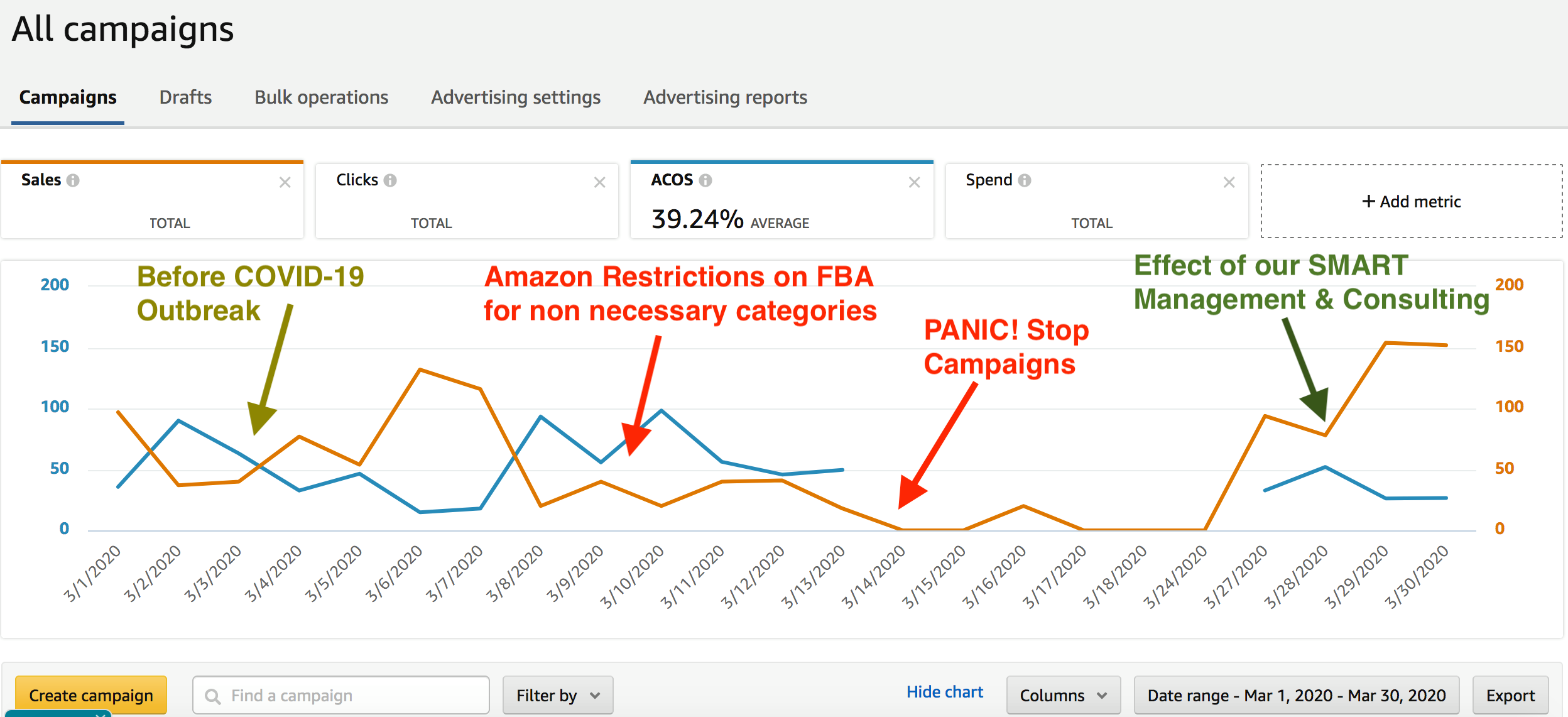
This screenshots says it all. We recently started working with a seller who had seen a dramatic increase of their CPC and had decided to completely stop his campaigns after Amazon initially announced inbound FBA restrictions for non necessary goods (their products are NOT defined necessary).
What did we do to revamp their PPC sales and to lower total ACoS%?
1. Introduce a clear strategy and organization to PPC Campaigns:
This is probably the most important aspect of a good PPC management. Having a clear division of campaigns, groups and ads is fundamental to avoid unnecessary waste of budget and to maximize sales for each product and variation. Dividing your campaigns by product and by objective is the first step to a clear and efficient Amazon Sponsored Products management.
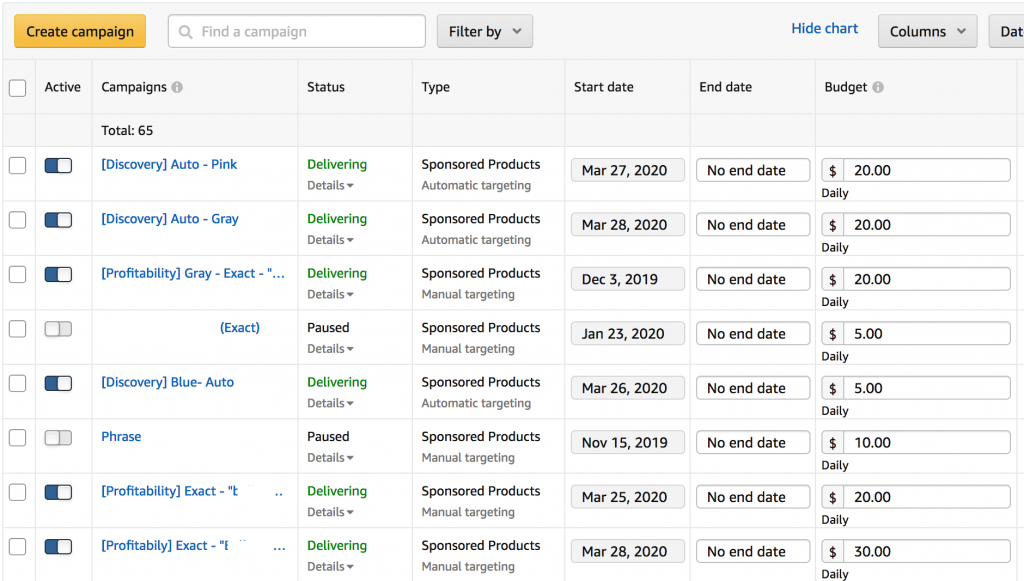
Still struggling with your Amazon Advertising? Let us help!
2. Spend more effort on Micro-Targeting instead of Macro-Targeting:
Today you need to apply a surgeon-focus to your Amazon search terms targeting. You need to select very carefully your keywords, using search terms as close as possible not only to the use and features of your product but to what a user is looking for. It is important for each seller to understand the meaning of “customer journey”: the buyer is more likely to look for broader terms when starting their search on Amazon. At this point they might just be shopping around and looking for items that slowly get closer to what they really want. Once they have figured it out, they’re more likely to perform a new search, using more specific terms. They might be as well long tail.
We have talked more about micro targeting on this blog post on How to Dominate Amazon in 2020.
3. Expand the search terms with what they didn’t think would bring value:
Seriously. You’re gonna need this. If you are looking for new search terms to add to your groups / campaigns, where would you normally get them from? Most of sellers get search terms from keyword tools, Amazon suggestions, and other external sources. Instead, what has revealed to be one of the best performing sources of targeting for us, is your own PPC search terms report. If you didn’t do it yet, download your search terms report (best for period of times of at least 30 days) and use the terms with a very high CTR and low clicks / no sales. Make new groups and keep an eye constantly on the performance, especially on the first days. Make sure to remove anything that is obviously not related. You will be impressed seeing how well these terms will perform in most of the cases.
4. Adding Organic Rank push to their basic PPC Strategy with External Traffic
We have talked about the importance of external traffic several times in this blog. We recently came up with a killer strategy that helped most of our clients to dramatically increase their sales while effectively bringing down their total ACoS% you can learn more about this strategy that combines PPC, Facebook Ads, Tracking links generators (our favorite is Pixelfy.me) and other tools, on this step-by-step video guide:
Be aware of the disruption of global supply chain
China was ground zero for the Coronavirus and the country shut down for nearly three months. One of these months was the Chinese New Year, something that many Amazon and e-commerce sellers prepared for. But the other two months greatly affected the global supply chain. One of the obvious reasons to avoid this disruption would be to diversify and source from surrounding countries such as India, or even from other countries such as Vietnam and even the US and Mexico. However, COVID-19 knows no borders and is spreading quickly in these countries, too.
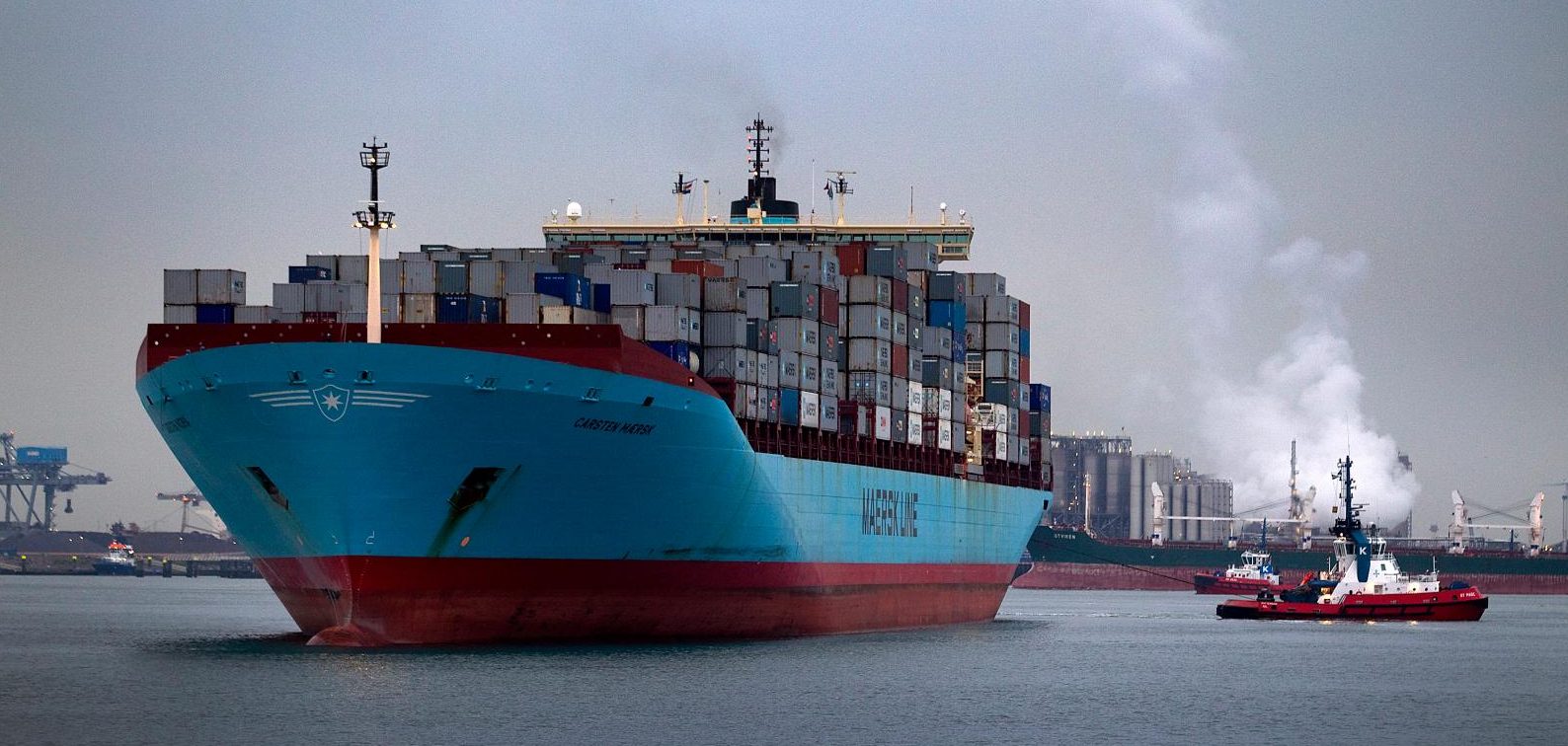
China is beginning to open up and factories are running once again. The economic damage of COVID-19 hit China very hard and the country is eager to get back on its feet. Big businesses such as Walmart, Target and Amazon are experiencing out-of-stock issues and third-party sellers are feeling the crunch.
As an Amazon seller, what you need to know is that this disruption to the supply chain will be felt well into the summer. As Amazon ships out essential items first, China is also focusing on meeting its own demand for essential supplies. Because of this, Prime Day 2020 is likely to be postponed and may happen in August.
This isn’t the time to give up, though. This is an opportunity for you to plan for Q3 and Q4 and make sure you source everything now so you can make up for losses later in the year.
Take the opportunity to learn, research and focus on your Brand
As we said in other occasions, diversification is one of the best things you can do as a business owner. Try to focus on your brand and products and try to implement new distribution channels avoiding to leave all your eggs into the “Amazon basket”. Saying it with Mike Michelini, host at Global From Asia:
I think the Coronavirus outbreak has been a wakeup call for Amazon sellers. While the FBA system is a beautiful way to outsource and streamline your warehousing and fulfillment, you start to realize that you are fully dependent on the Amazon ecosystem – from sales to shipping. As many learn under pressure how to setup FBM systems and warehousing, we must realize there is more to e-commerce than simply Amazon. That is the biggest development and mindset shift I have started to notice in the seller world.
If your online sales have declined, this means you have more time on your hands. Don’t use this time to panic because of the COVID-19 global pandemic. Use this time to learn more about Amazon and e-commerce. Learn how to optimize your listings, listen to podcasts and read guides on how to master PPC. Become an Amazon expert so you will be ready when all this ends.
Take the time to research new countries and factories to source from and diversify your supply chain. Take the time to add new products to your line-up and follow the trends that are happening online. See what will be major sellers during and after the coronavirus pandemic. COVID-19 has forced a lot of traditional shoppers into online shopping, take advantage of this in 2021!
Finally, focus on your brand. Make sure you have a registered brand if you want to succeed. Communicate with your customers on Amazon and take to social media to keep in touch off Amazon. This is a great time to research potential social media influencers and work with them to raise your brand awareness and overall sales. Customers remember the brands that communicate with them. Whether its to offer a promotion or to give an update on your products and wish them health and safety.

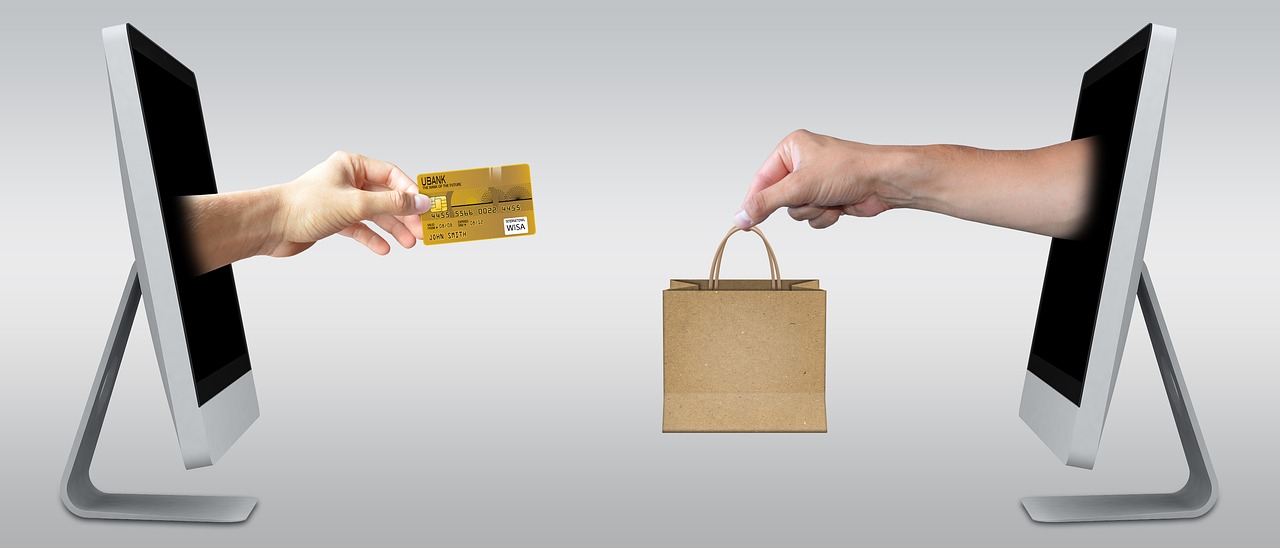
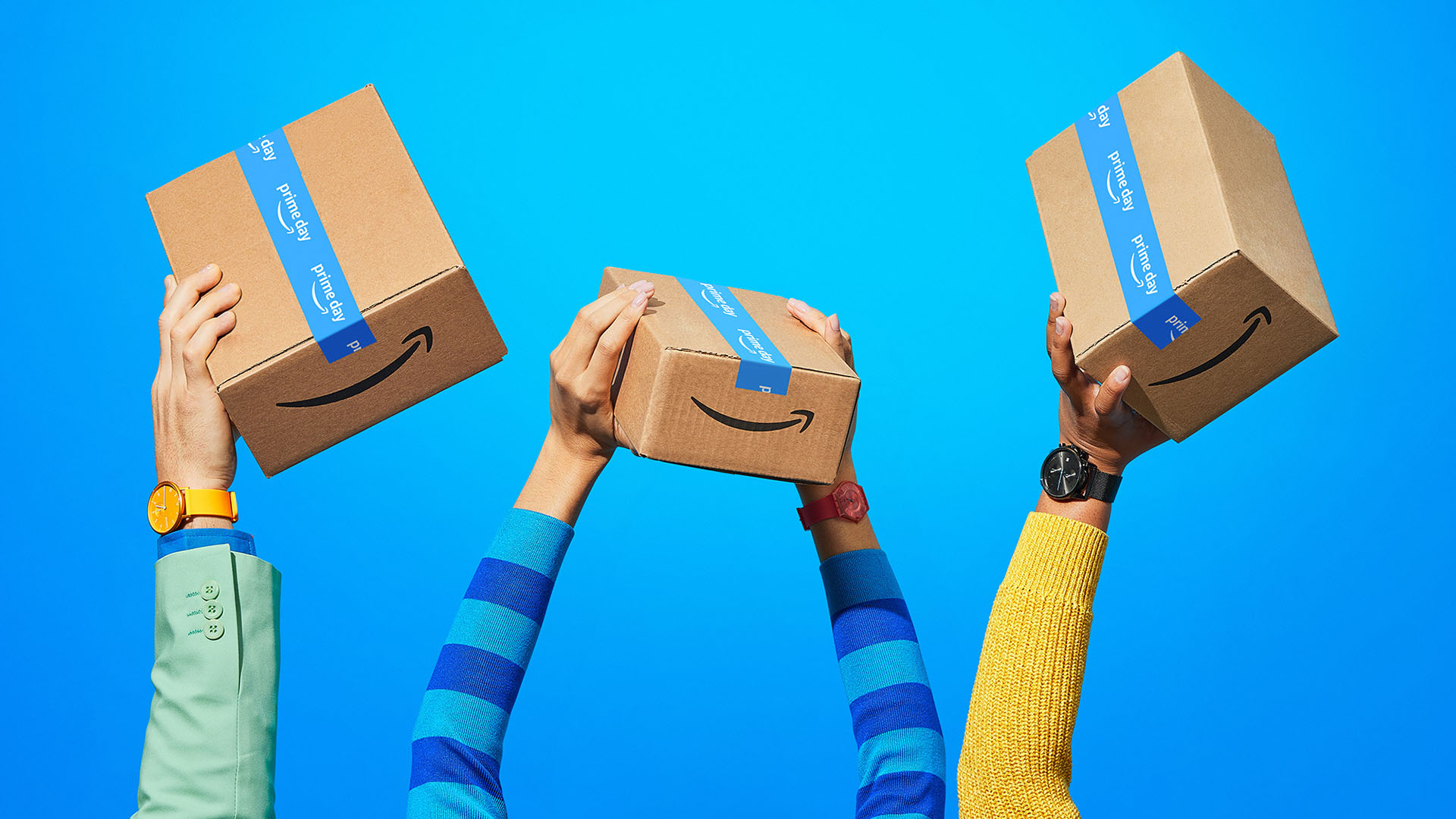
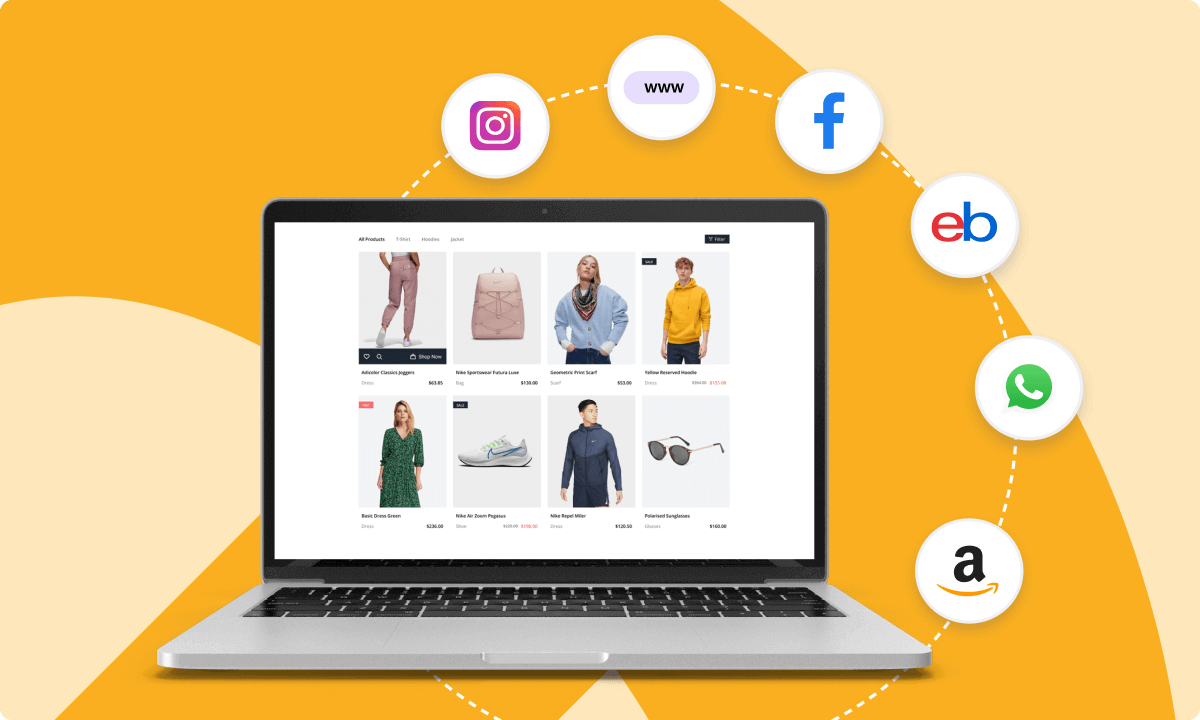
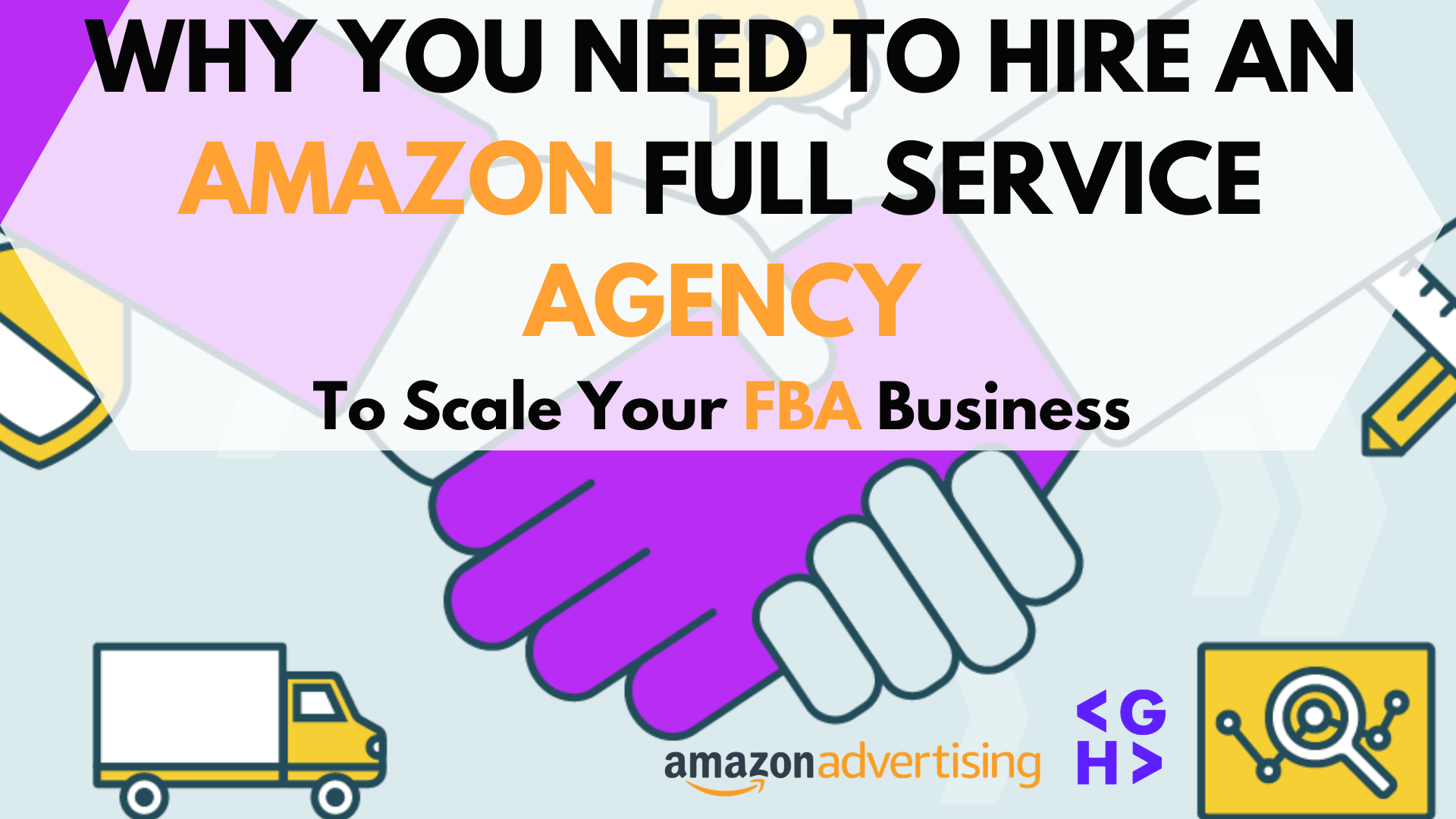

Jeff Smith
COVID 19 pandemic shaken the business and growth; however, the online business can still stand firm with the help of the digital boom.